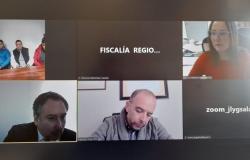
The launch of the new Renault Megane E-Techthe second of three 100% electric models that the French brand will sell in our country starting this year, and with the Colon Theater as a stage to unite technology and the future of mobility with the history of a brand strongly rooted in Argentine consumers, it was the excuse for an extensive talk with Pablo Sibilla, President and General Director of Renault Argentinain which the central topic was the situation of the Argentine automotive industry in these first months of 2024.
“We are seeing that the market stopped falling. It’s not falling anymore. In the last two months, I would say we were positively surprised by the size. We will have to see the reasons, but it surely has to do with the offer that there is at this moment, which is enormous. There is financing at a 0% rate for the purchase of a vehicle, insured deliveries in savings plans, discounts, promotions. That is supporting the market. How long this will last depends a lot on stock levels and how much stock is available. each brand to defend the volume. The good thing is that this is a free market. Offer and demand. “Everyone will do what they consider best for their objectives,” said Sibilla in a first analysis of April sales numbers, which for the first time in the year are showing a recovery after the sharp 30% drop that was recorded in the first quarter.
The executive explained the origin of car prices and highlighted that, despite what many believe, they have not increased that much since the new government took office. “The devaluation was 145% since approximately December 1 and cars didn’t increase anywhere near that, but you also have to add the PAIS tax, which rose 10 points. This means that the pressure for profitability on companies is enormous. The reality is that we are far from making money due to this combination of context where there was a strong devaluation, an increase in the PAIS tax and a kind of price war. Profitability is bad for all brands. “We are not making money.”he pointed.
According to the executive, in this scenario each brand has its strategy regarding how to also deal with the car import and payments within 180 days that govern them as the only limitation now that the discretionary import permits that existed until December 2023 have disappeared.
“One always has to have a very long-term vision, otherwise when there are problems like this you would have to stop the sale and that destroys the market. You have to think that behind it there is also a network of dealers that has been working with us for 40 or 50 years. You can’t run a company by suddenly braking and suddenly accelerating. What you have to do is optimize some models and versions, and adjust what you can. There is no need to panic for four months. You have to stay calm and say ‘ok, this first semester is like this’. We believe that the market will settle down for the second half,” said Sibilla, immediately adding that “the government is quite optimistic that by the middle of the year There will be news regarding deregulation of some issues related to payments”.
But beyond the sales and the recovery that can occur with the injection of foreign currency that the liquidation of agriculture will generate, what all those responsible for the automotive industry have been highlighting as the great problem on which we must work together with the government , is the high tax burden that it has to produce and market cars in Argentina.
On April 11, the first meeting between the automobile factories grouped in ADEFA and the economic team of the national government, headed by himself Minister of Economy, Luís Caputo. Although the details remain in an “agreed reserve” state between the parties, the feeling that it left in the representatives of the terminals has been one of great receptivity and interest in short and medium-term issues.
“There is the market situation on the one hand and the collection on the other. You always have to measure what impact has any measure taken on collection, and that is a job that the Ministry of Economy does. We have touched on many topics, the meeting was very long, more than an hour and a half,” Sibilla said in this regard.
“We are more focused on the export competitivenessbecause if the internal market falls, sometimes this happens because there are periods of adjustment of the economy, but we need External flows allow us to compensate for this fall. So there is work that must be done to go little by little, nothing will be for tomorrow, to improve Argentine competitiveness,” he highlighted.
The president of Renault Argentina exemplified the situation by explaining that “today, A car produced in Argentina exports between 22 and 25% taxes. That same car, exported from Brazil has a load of 7% and from Mexico 0%. When the parent company has to decide in which country to make an investment, that information is key because investments are made to export to other markets. That is one of the topics we planned, and I must say that Economía was very interested and, in fact, asked us get together every two or three monthswhile there is a group of technicians below, made up of people from ADEFA and the government working on that long-term strategy for the industry.”
On several occasions, Sibilla highlighted that the government has only been in place for four months and that there is a priority placed on Argentina’s macroeconomic issues. “These problems we have do not come from three months ago and many do not come from the previous government either. Taxes have been accumulating for many years and today it brings us to this situation. How do we solve it? There is a short-term discussion in which we have to see what can be fixed, and then we have to see how we set a long-term strategy for that to disappear and production is not taxed, consumption is taxed, but not production.”
The Brazilian case inevitably jumps out when talking about investments and production costs. Sibilla, as happened in recent weeks with Martin Galdeano and Ricardo FlamminiPresidents of Ford South America and Nissan Argentinahighlighted the program MoVer of the Lula Da Silva government as the perfect example of how a policy that bets on production generates immediate interest, and of the role that Argentina has to play to not be relegated to its main economic partner.
“In the first quarter of this year Brazil announced investments of 20 billion dollars in automotive industry. That’s huge. And although the investments in general are for LATAM, our conversation with the government was in the sense of trying to ensure that these investments, which are announced by our own parent companies that are also on both sides of the border, come to our country. For that we fear that we have certain conditions, and the tax issue on exports is one of them.”
When the new Renault Kardian was launched in Brazil last year, the compact pick-up that will be manufactured in Santa Isabel, Córdoba, probably from 2026. Although there are still no figures to comment on, Sibilla assures that the investment is confirmed. “We have received many visits from France in recent times, everyone left very happy and convinced of the conversion we are making towards a long term utility vehicle factory, because the investments that will be made will be for the next 70 years. Of course we have to deal with temporary crisis situations such as there may be this year, but that does not change one centimeter of the decisions we made and that we have been working on for four years,” highlighted the President of Renault Argentina.





